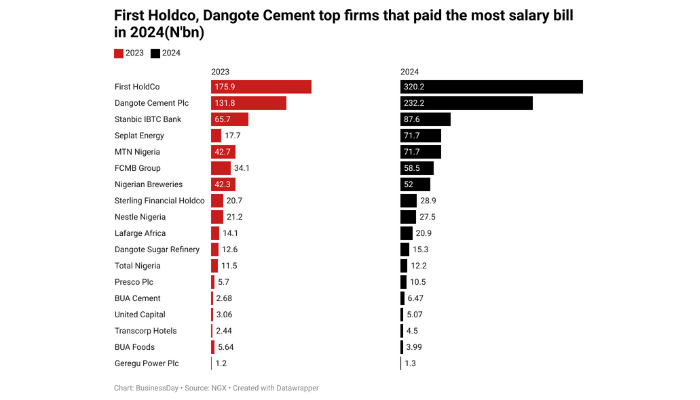Despite mounting macroeconomic pressures, Nigeria’s largest corporations demonstrated resilience in 2024 by sustaining high employment levels and investing heavily in their workforce. The top ten employers listed on the Nigerian Exchange (NGX) collectively provided jobs for 84,491 people, reflecting their critical role in bolstering employment across the country.
According to financial data compiled by Nairametrics Research, these corporations—operating in sectors such as banking, consumer goods, and industrial manufacturing—spent a combined ₦1.695 trillion on salaries in 2024 alone.
The figures highlight the importance of large enterprises in supporting Nigeria’s labor market, especially at a time when the nation’s youth face considerable employment challenges. Data shows that youth aged 15 to 24 accounted for over half (55.3%) of the labor force. However, while 50.6% were gainfully employed, 8.4% remained unemployed, and 14.4% were neither in education, employment, nor training—an increase from 13.7% in the previous quarter.
One of the leading employers, Stanbic IBTC, part of the Standard Bank Group, recorded a workforce of 3,243 in 2024—up 6.1% from 3,056 the previous year. The bank maintained a relatively balanced gender ratio with 1,511 women (47%) and 1,732 men (53%) on its payroll. In a notable sign of rising labor investment, Stanbic IBTC increased its wage bill by 33%, from ₦61.19 billion in 2023 to ₦81.72 billion in 2024.
Although the reported employee numbers span operations beyond Nigeria—stretching across other African countries and even into Europe—these companies’ presence at home continues to act as a buffer against Nigeria’s escalating unemployment concerns.
Industry experts note that these firms not only provide direct employment but also support secondary job creation through supply chains, services, and corporate social investments. Their consistency in hiring despite economic headwinds positions them as vital players in stabilizing the job market.
As Nigeria works toward inclusive economic recovery, the role of these corporations remains central in driving productivity, reducing poverty, and empowering the country’s vast and youthful population.

